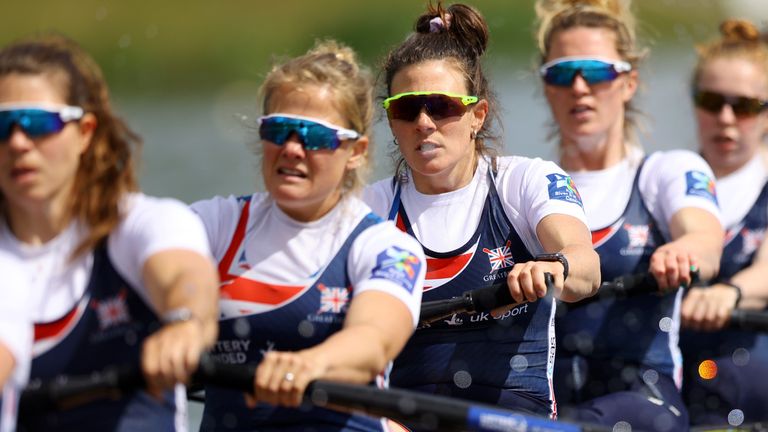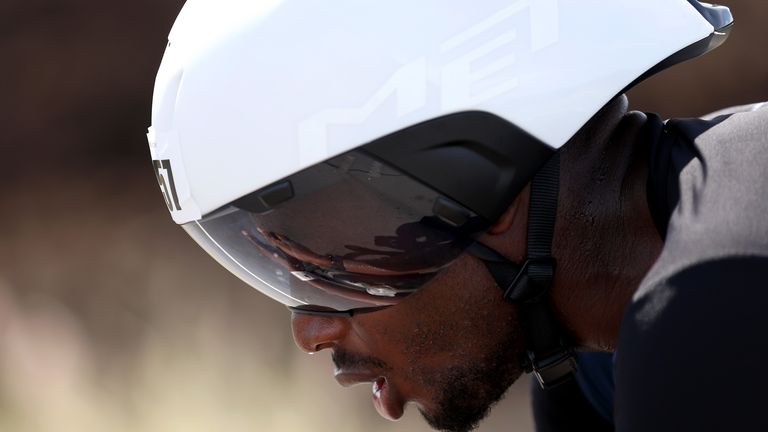Neurodiversity Celebration Week: British rower Caragh McMurtry, ironman Sam Holness on being autistic
Former GB rower Caragh McMurtry, whose autistic diagnosis "revolutionised" her life "from being spare to making Olympic team", and ironman triathlete Sam Holness - diagnosed as autistic aged three, and didn't speak until he was six - speak to Sky Sports in Neurodiversity Celebration Week
Thursday 16 March 2023 13:04, UK
This week is Neurodiversity Celebration Week, celebrating the one in five people who think differently. These include autistic, dyslexic, dyspraxic athletes, or those with ADHD, who often face invisible barriers in sport.
In Neurodiversity Celebration Week, former British rower Caragh McMurtry and ironman triathlete Sam Holness talk to Sky Sports News about life thinking differently.
McMurtry, founder of Neurodiverse Sport, an organisation supporting athletes who are neurodivergent, was initially diagnosed with bipolar disorder while competing.
Five years later, she was diagnosed as autistic which allowed her to access more support. She is now using her platform to campaign for better access and understanding within sport.
She explained: "It completely revolutionised my performance and my well-being and I went from being spare to making the Olympic team. I got 17 seconds faster on my 2K and I was generally a lot happier.
"Ultimately, I still faced quite a lot of stigma and discrimination and a lot of that came down to a lack of understanding from the people around me and that's where I decided to step away and create Neurodiverse Sport.
"Neurodiverse Sport is ultimately there to change people's perceptions around neurodiversity, to show them in a positive light or that they can be positive. Difference is not less, it's not scary, it requires out-of-the-box thinking. It could provide that extra edge.
"We want to create role models because that is something that is really lacking, particularly in sport, because athletes are advised not to disclose their neurodivergence.
"We want to do those things by campaigns, raising awareness and educating sports teams and sports organisations and that's something we've really started to do."
"There have been a lot of athletes that have come forward and it increases exponentially. A month ago I would have said I'd had 100 athletes come to me and now I can probably say I've had 150. A lot of them are elite or people on the Olympic programmes.
McMurtry said many who have contacted her have said, while they are not ready to talk publicly about being neurodivergent, the organisation's presence has made a difference.
While competing as a rower, McMurtry's blunt and honest manner often caused issues, as did sensory challenges. She points towards unconscious bias and wants coaches to be aware of neurodiversity.
"It could make a real difference, if something goes wrong with the team, to not pinpoint it down to the person that looks different. It's human nature really, but it really sent me on a downward spiral.
"It baffles me that neurodiversity is something that is still stigmatised in sport. I just don't understand how you're trying to get 0.001 out of your performance, like why are we not looking into that?
"I really think that people, athletes that are different, shouldn't be made to feel as bad as they do, as isolated as they do. Their differences can be embraced, optimised, then if they don't make it, that's fine, it's fair."
One athlete McMurtry has already endorsed through her work is Sam Holness, an ironman triathlete who was diagnosed as autistic aged three. He did not speak until he was six and lives in west London with his parents.
Now a Guinness World Record holder for being the first autistic person to compete in the Ironman World Championships, Holness wants to inspire others.
While preparing for this week's ironman in Lanzarote, Holness said his aims for the next year are to complete a full Ironman in less than 10 hours and complete a marathon in less than three.
On his achievements, he said: "I get comments on Instagram about how inspiring I am during races and training. It's very enjoyable but sometimes I feel like 'wow'."
Holness continues to overcome communication difficulties, something his dad Tony says is one of his biggest achievements. Meeting new people in new environments is particularly hard.
Enthusiasm for exercise and routine is what Holness puts his success down to: "It helps with my confidence and self-esteem. It takes my anxiety away and makes me feel more relaxed."
Life away from the soothing repetition of training and competition is more difficult. He says: "At the track, sometimes I have to get away because it gets overwhelming".
Despite this, Holness has got better at managing crowds. He grew up struggling with parties and gatherings, even attending church, but it was at university, fellow students helped introduce him to new environments.
Thanks to the support of parents Tony and Marilyn, Holness is now able to travel all around the world and compete. As well as difficulties socially, he struggles with IBS (Irritable Bowel Syndrome) which requires a carefully constructed diet.
Despite all the difficulties, Holness is clearly enjoying breaking stereotypes as an ironman and using his love of repetitive activity to his advantage.
Holness says for the next year, his aim is to "get to the podium and become a professional triathlete." This year's World Championships will be held in Finland, for which he hopes to qualify again.
McMurtry and Holness' experiences offer an insight into the strengths and challenges of thinking differently in sport. However, like many athletes, they wonder when sport will more openly discuss neurodiversity.







